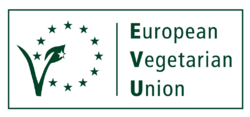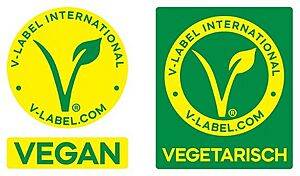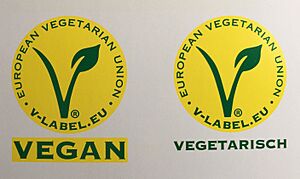European Vegetarian Union facts for kids
 |
|
| Abbreviation | EVU |
|---|---|
| Formation | 1988 |
| Founded at | Hilversum, Netherlands |
| Type | Non-profit organisation |
| Registration no. | 109356110578-03 |
| Focus | Vegetarianism/Veganism |
| Location |
|
|
Area served
|
Europe |
|
Members (2020)
|
43 member organisations from 28 countries |
|
Official language
|
English |
|
General Secretary
|
Louise Johansen |
|
President
|
Felix Hnat |
|
Vice President
|
Sebastian Joy |
|
Treasurer
|
Johannes Gilli |
| Affiliations |
|
| V-label | |
|---|---|
| Effective region | Worldwide |
| Effective since | 1995 |
| Product category | Food label |
| Legal status | Consumer recognised |
| Website | www.v-label.com |
The European Vegetarian Union (EVU) is a special group that helps connect different vegan and vegetarian organizations across Europe. It's a non-profit group, which means it doesn't try to make money. The EVU works on important topics like healthy eating, protecting consumers, and how our food choices affect the environment. It also focuses on clear food labels. The current General Secretary is Louise Johansen from Denmark.
Contents
EVU's History
The EVU has been active for many years. It helps spread information about vegetarian and vegan lifestyles.
Early Activities
- In 1995, the EVU helped share a film called Devour the Earth. This film was about how eating meat affects the world. It was made by the Vegetarian Society and narrated by Paul McCartney.
Protecting Vegan Meals
- In 2011, a rule in France tried to stop schools from serving vegan meals. Renato Pichler, a leader at the EVU, spoke out against this rule. The EVU works to make sure people have choices for plant-based meals.
What the EVU Does
The main goals of the European Vegetarian Union are:
- To support and represent its member groups across Europe. It helps them work together.
- To teach people about vegetarian and plant-based eating. It shows the benefits of this lifestyle.
- To talk to governments and other big organizations. The EVU wants them to consider plant-based issues when making decisions.
- To promote clear and honest food labels. This helps vegetarian and vegan shoppers know what they are buying.
Food Labels
The EVU cares a lot about how food is labeled. They want it to be easy for people to find vegetarian and vegan products.
The V-Label
The V-Label is a special symbol that shows if a food product is vegetarian or vegan. The EVU used to be the main group behind this label. Some of the EVU's member organizations still help certify products with the V-Label. This label started in 1995. It was updated in 2023 to make it clearer whether a product is vegan or just vegetarian.
Defining Labels in Europe
The European Vegetarian Union has worked hard to create clear rules for using the words "vegetarian" and "vegan" on food. They believe these labels should have a standard meaning.
They have two main ideas for these rules:
- Food labeled "vegan" or "vegetarian" should not have any non-vegan or non-vegetarian ingredients added on purpose.
- If tiny, accidental traces of non-vegan or non-vegetarian stuff get into the food, it should still be allowed to be labeled vegan or vegetarian. This is only if the company was very careful and followed the best ways to make the food.
At first, the European Commission did not make these changes. But the EVU kept talking to governments, especially in Germany. In Germany, many people supported these labeling rules. Because of this, German consumer protection leaders agreed on a definition for "vegan" and "vegetarian" food labels. This definition is now used by food safety groups in Germany.
See also
 In Spanish: Unión Vegetariana Europea para niños
In Spanish: Unión Vegetariana Europea para niños
- List of vegetarian and vegan organisations
- The Vegan Society (United Kingdom)
- Vegetarian Society (United Kingdom)
- Vegetarian and vegan symbolism
Animal Protection Groups
- Human Environment Animal Protection Party (Tierschutzpartei)
- Viva!



